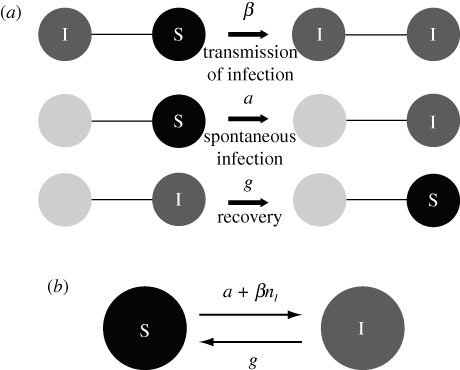
Emotions as Infectious Diseases in a Large Social Network: The SISa Model
Abstract
Human populations are arranged in social networks that determine interactions and influence the spread of diseases, behaviours and ideas. We evaluate the spread of long-term emotional states across a social network. We introduce a novel form of the classical susceptible–infected–susceptible disease model which includes the possibility for ‘spontaneous’ (or ‘automatic’) infection, in addition to disease transmission (the SISa model). Using this framework and data from the Framingham Heart Study, we provide formal evidence that positive and negative emotional states behave like infectious diseases spreading across social networks over long periods of time. The probability of becoming content is increased by 0.02 per year for each content contact, and the probability of becoming discontent is increased by 0.04 per year per discontent contact. Our mathematical formalism allows us to derive various quantities from the data, such as the average lifetime of a contentment ‘infection’ (10 years) or discontentment ‘infection’ (5 years). Our results give insight into the transmissive nature of positive and negative emotional states. Determining to what extent particular emotions or behaviours are infectious is a promising direction for further research with important implications for social science, epidemiology and health policy. Our model provides a theoretical framework for studying the interpersonal spread of any state that may also arise spontaneously, such as emotions, behaviours, health states, ideas or diseases with reservoirs.
Citation:
A.L. Hill, D.G. Rand, M.A. Nowak, and N.A. Christakis, "Emotions as Infectious Diseases in a Large Social Network: The SISa Model" Proceedings of the Royal Society B, 277(1701): 3827-3835 (December 2010); http://dx.doi.org/10.1098/rspb.2010.1217